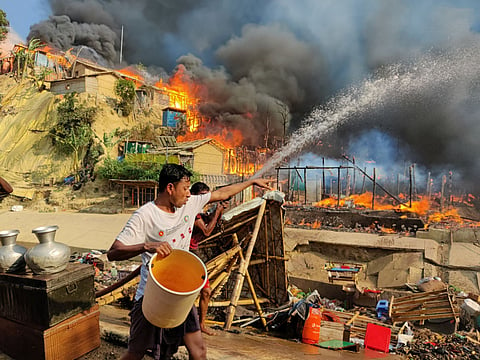Young Rohingya refugees try to fight a massive fire that broke out in a refugee camp at Cox's Bazar on 5 March 2023. The situation in the Rohingya refugee camps was already dire, and a recent reduction in food rations is exacerbating their suffering. Photo: Sahat Zia Hero
Politics
A Rohingya photographer’s dispatch on food-aid cuts in the refugee camps
The reduction in World Food Program rations for Rohingya refugees in Cox’s Bazar, Bangladesh, is exacerbating their immense suffering. Food insecurity and malnutrition, already acute, are worsening.
"I have no more rice to cook for my children," Nasima, a mother of three, said. "The last remaining rice I had was burnt in the fire."
The great fire that occurred on 5 March 2023 in the Rohingya refugee camps at Cox's Bazar, near the Bangladesh–Myanmar border, left nearly 16,000 refugees homeless. It also destroyed already limited food rations, as well as vital facilities for water, health and education. The fire started at 2:45 pm and burned till 5 pm on a windy day – it was impossible to salvage the bamboo-and-tarp shelters of the settlements. Thousands of families were unable to recover anything of their household assets, left with little choice but to flee the fire and save their lives.

